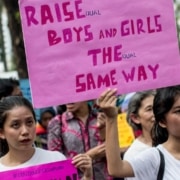
According to one survey, only 45 per cent of married and sexually active adolescents in Indonesia use contraception. Photo by Dương Nhân.
Contraception is not simply a method to prevent pregnancy. Given the suspicion – if not outright hostility – toward contraception that is common to most religions, debates over its regulation are often deeply political and value-laden.
The problem is that suspicion does not solve problems. In Indonesia, adolescents cannot legally access birth control unless they are married. Yet many adolescents are sexually active, whatever their marital status. In fact, according to Unicef, one in nine Indonesian adolescents are sexually active. The Indonesian Demographic and Health Survey (SDKI) puts the figure even higher, at one in four. They have an urgent need for contraception.
There are more than 45 million 10-19 year olds in Indonesia. In 2017, the SDKI found that only 45 per cent of married or sexually active adolescents aged 15 to 19 said they used contraception. This means the other 55 per cent either had no plans to use contraception or had limited exposure to knowledge about their bodies, sexuality, reproductive health, and contraceptives. These are concerning findings.
A 2016 study by Rumah KitaB found that from 52 female adolescents who married in childhood, 36 (about 70 per cent) got married because of unwanted pregnancies. Nearly all admitted that they never used contraception when they had sex, either because they didn’t know how to obtain the pill or didn’t have the courage to ask their partners to use a condom.
Only one tenth of the child brides surveyed had access to contraception. They usually acquired it from private midwives, not state-run community health centres (puskesmas), with the help of their mothers or mothers-in-law.
On World Contraception Day on 26 September, Indonesia received the distinction of being the country with the greatest unmet need for contraception. Lack of legally available contraception for adolescents contributed to this result. Indonesia was once a leader in family planning but it is fast becoming one of the worst performers in the region.
How did we get to this point? The main problem lies in flawed population policies. Grounded in the ideology of “developmentalism”, which held that the nation would become prosperous if population growth could be controlled, the New Order regime strictly applied a Family Planning project called Keluarga Berencana, or KB.
Using a wide range of methods and approaches, Indonesia’s population policy was deemed successful. But the program’s occasionally coercive methods, in which those who did not practice KB were treated as “the other”, alienated many. This included sections of the Muslim community, which was under the most suspicion when the program was first applied. Any effort to question, let alone oppose, the assertion that families would become prosperous through the KB program was simply crushed by the state.
Islamic mass-based organisations – first Nahdlatul Ulama, and later Muhammadiyah – tried to assuage Muslim anxieties about New Order enforcement of the KB policy. These two organisations agreed to support the New Order government’s population program, relying on interpretation and exploration of Islamic arguments. They justified support for KB in the name of both darurat (emergency) and maslahat (the greater good) to avoid even greater mudharat (harm) if the size of the population were not controlled.
However, this theological discourse from NU and Muhammadiyah certainly did not comfort everyone in the Muslim community. Even today, many Muslims are suspicious of family planning as a “western project” to reduce the size of the Muslim population.
This is not simply because the religious arguments are insufficient to convince them, for example because of differences in interpretation or exploration of Islamic law. Rather, narratives about “genocide of the Islamic community” have taken root, and are now considered truth by many people.
Those who reject family planning point to the fact that promises about family planning delivering prosperity were never truly realised, but it did reduce the size of many Muslim families.
Another problem is that there was never any theological debate or discussion of Islamic jurisprudence (fiqh) on the use of contraception by young people during the New Order era. The state seemingly sought to increase the moral acceptance of the KB program by guaranteeing that it would not be accessed by adolescents.
The Criminal Code (KUHP) (under Article 283) and the 2009 Population Growth and Family Development Law (under Article 26) still explicitly prohibit provision of contraception services to adolescents and unmarried couples, apart from information, and even that is restricted, with punishments of fines and imprisonment if violated. These prohibitions on serving the needs of adolescents were clearly a “band-aid” strategy to contain the anxiety and suspicions of the religious community.
Ignoring adolescents’ need for contraception has created a huge gap in addressing the problems of reproductive health in Indonesia. Adolescents are now a quarter of the population and among those who most need information on reproductive health and contraception services.
Indonesians cannot simply shut their eyes to the reality that the age at which girls are menstruating and becoming sexually active is steadily decreasing. At the same time, underage marriage is also becoming more common – on the grounds of fear of committing the “sin of premarital sex”, or if pregnancy has already occurred.
As long as the government remains closed to discussion on reproductive health education for adolescents, and the law remains unchanged, young people will remain shut off from accurate information.
The government’s reluctance to address adolescent sexual and reproductive health also provides room for conservative religious groups to push their position. And their solution is worryingly simplistic: Just marry them off!
Now is the time for the state, assisted by NU and Muhammadiyah, to come down from the mountaintop, and take a frank and pragmatic look at adolescent sexuality. Gaps in information and reproductive health services, including contraception services for adolescents, must be addressed.
If not, Indonesia can look forward to a grim future of more and more child brides and unwanted pregnancies.
An earlier version of this article was published in Kompas on 12 October as “Kontrasepsi bagi Remaja”.








